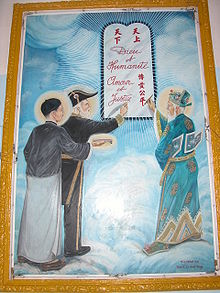- Nguyen Binh Khiem
-
Nguyễn Bỉnh Khiêm 
Khiem (right) is shown here alongside Sun Yat-sen and Victor Hugo as a Cao Dai saint.Born 1491 Died 1585 Nationality Vietnamese Other names Trạng Trình Occupation Magistrate, poet, educator Known for Khiem's oracular poetry has been compared to that of Nostradamus. It contains the earliest known use of the word "Vietnam." Nguyễn Bỉnh Khiêm (阮秉謙; 1491 – 1585) was a Vietnamese administrator, educator, poet, sage and is a saint of the Cao Dai religion. He is referred to by several names: Hanh Phu, Bach Van cu si (White Cloud Hermit) and Trạng Trình.
Born on the coast in Cổ Am village (which is now part of Hai Phong). As an adult, he studied knowledge from the second-rank doctor Lương Đắc Bằng and passed the official government examination at the fairly late age of 44 in the exams of 1535. However, he passed the exam, ranking number one in the country. This was a period of great instability in Vietnam which may explain why he took the exam at such a late age. He served in the Mạc Dynasty court for just seven years until 1542 when he resigned after his official complaints of government corruptions were ignored. He then returned to his native village and opened a school. Among his students were Phùng Khắc Khoan (diplomat), Lương Hữu Khánh, Nguyễn Dữ (author of Truyền Kỳ Mạn Lục).
Khiêm became a person much sought after by many leaders during that time of upheaval, civil war, the Mạc collapse, and the rise of the Trịnh Lords and Nguyễn Lords. Both Trịnh Kiểm and Nguyễn Hoàng purportedly sought his advice in their pursuit of power. To the former, he gave the advice of being the real power behind the (restored) Lê Dynasty. To the latter, he advised building a base of power in the undeveloped south. Both men followed these suggestions, resulting in a political and military division of Vietnam that would last for 200 years. As a result of this sage advice, Khiêm gained a reputation as someone who could foretell the future. Some of his prophicies were of a Delphic nature as they were ambiguous and could be read in several ways.
Khiêm was also a poet, composing many poems in Chinese and Nôm that have survived to this day. There is a long poem attributed to him called Sấm Trạng Trình (The Prophecies of Trạng Trình).[1] (Trạng Trình is one of Khiêm's nicknames.) This is the Vietnamese equivalent of the Nostradamus quatrains. It is suggestive, believed to predict future events, and very mysterious. This poem includes the line, "Vietnam is being created" (Vietnamese: Việt Nam khởi tổ xây nền),[1] an early use of the word "Vietnam".
Most cities in Vietnam have named major streets after him.[2]
References
- ^ a b Nguyễn Bỉnh Khiêm, "Sấm Trạng Trình"
- ^ Vietnam Country Map. Periplus Travel Maps. 2002–03. ISBN 0-7946-0070-0.
Further reading
- Ta Ngoc Lien Renowned Vietnamese Intellectuals: Nguyen Binh Khiem, The Gioi Publishers, 2004.
- Nguyễn Huyền Anh. Việt Nam Danh Nhân Từ Điển.
- Phạm Thế Ngữ. Việt Nam Văn Học Sử.
- Trần Trọng Kim. Việt Nam Sử Lược.
Categories:- 1491 births
- 1585 deaths
- People from Hai Phong
- Cao Dai saints
- Vietnamese poets
- Vietnamese saints
Wikimedia Foundation. 2010.
